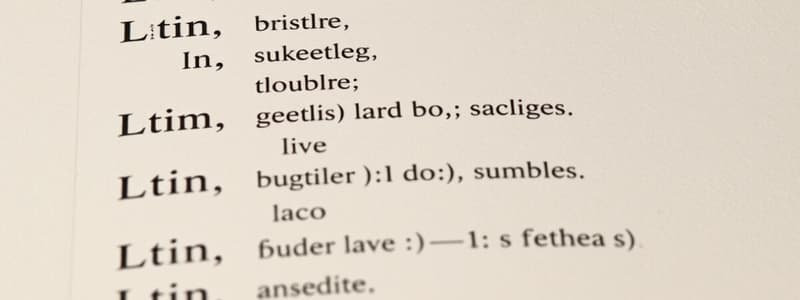Podcast
Questions and Answers
To be careful, one must ______.
To be careful, one must ______.
cavēre
Teachers ______ their students.
Teachers ______ their students.
docēre
We ______ a lot of responsibilities.
We ______ a lot of responsibilities.
habēre
She will ______ at home this weekend.
She will ______ at home this weekend.
He was warned to ______ caution.
He was warned to ______ caution.
The athlete trains to ______ well.
The athlete trains to ______ well.
The student wishes to ______ the subject thoroughly.
The student wishes to ______ the subject thoroughly.
The comedian's jokes made everyone ______.
The comedian's jokes made everyone ______.
He felt a deep sense of ______ before the exam.
He felt a deep sense of ______ before the exam.
We must ______ for the consequences of our actions.
We must ______ for the consequences of our actions.
Multī vident, sed pauci ______.
Multī vident, sed pauci ______.
Hic locus ______ tantum est.
Hic locus ______ tantum est.
Adulescentēs saepe ______ in schola.
Adulescentēs saepe ______ in schola.
Fera rustica ______ bestias.
Fera rustica ______ bestias.
Magister ______ discipulos docet.
Magister ______ discipulos docet.
Sedes in horto ______ iucunda est.
Sedes in horto ______ iucunda est.
Diligenter ______ responsa.
Diligenter ______ responsa.
Pueri currunt ut ______ libero.
Pueri currunt ut ______ libero.
Terra ______, omnis gloria subit.
Terra ______, omnis gloria subit.
Civis ______ pro libertate sua.
Civis ______ pro libertate sua.
Flashcards are hidden until you start studying
Study Notes
Verb Conjugations and Meanings
- caveō, cavēre, cavī, cautus: To beware or be careful; emphasizes caution in actions.
- doceō, docēre, docuī, dōctus: To teach; relates to imparting knowledge or skills.
- habeō, habēre, habuī, habitus: To have or hold; signifies possession, both physically and metaphorically.
- maneō, manērē, mānsī, mānsus: To remain or stay; indicates persistence in a place or condition.
- moneō, monēre, monuī, monitus: To warn or advise; crucial for guidance and precaution.
- moveō, movēre, mōvī, mōtus: To move, excite, or affect; implies influence or physical motion.
- placeō, placēre, placuī, placitus: To please (+ dat); signifies approval or satisfaction toward someone or something.
- rīdeō, rīdēre, rīsī, rīsītus: To laugh or smile (at); reflects joy or amusement.
- sedeō, sedēre, sēdī, sessus: To sit, set, or settle; denotes a state of being at rest.
- studeō, studēre, studuī, -: To study (+ dat); emphasizes the pursuit of learning or knowledge.
- teneō, tenēre, tenuī, tēnsus: To hold onto; implies grasping or maintaining possession.
- terreō, terrēre, terruī, territus: To scare, frighten, or terrify; related to causing fear.
- timeō, timēre, timuī, -: To fear or be afraid (of); indicates apprehension or anxiety.
- valeō, valēre, valuī, valitus: To be well or strong; pertains to health and well-being.
- videō, vidēre, vīdī, vīsus: To see or perceive; relates to visual awareness.
Additional Verb Meanings
- ārdeō, ārdēre, ārsī, ārsus: To be on fire, burn, or blaze; connotes intense heat or passion.
- audeō, audēre, ausus sum: To intend, be prepared, or dare; signifies courage and determination.
- contineō, continēre, continuī, contentus: To contain, enclose, or restrain; signifies limitations or boundaries.
- dēbeō, dēbēre, dēbuī, dēbitus: To owe or must; indicates obligation or necessity.
- dēleō, dēlēre, dēlēvī, dēlētūs: To erase, expunge, or destroy; emphasizes total removal.
- exerceō, exercēre, exercuī, exercitus: To exercise or train; relates to physical or mental conditioning.
- iubeō, iubēre, iussī, iussus: To order or command; signifies authority and direction.
- lūceō, lūcēre, lūxī, -: To shine or be apparent; suggests illumination and clarity.
- misceō, miscēre, miscuī, mixtus: To mix, mingle, or stir up; relates to blending or combining elements.
- noceō, nocēre, nocuī, nocitus: To harm or injure (+ dat); indicates negative impact on someone or something.
- pāreō, pārnēre, pāruī, paritus: To obey or be obedient to (+ dat); emphasizes compliance.
- persuādeō, persuādēre, persuāsī, persuāsus: To persuade or convince (+ dat); focuses on influencing opinions or decisions.
- respondeō, respondēre, respondī, respōnsus: To answer or respond to; signifies communication and dialogue.
- retineō, retinēre, retinuī, retentus: To hold back or retain; indicates control or delay.
- urgeō, urgēre, ursī, -: To press or urge; implies motivation or insistence.
- voveō, vovēre, vōvī, vōtus: To vow or dedicate to; signifies commitment to a cause or promise.
Verb Conjugations and Meanings
- caveō, cavēre, cavī, cautus: To beware or be careful; emphasizes caution in actions.
- doceō, docēre, docuī, dōctus: To teach; relates to imparting knowledge or skills.
- habeō, habēre, habuī, habitus: To have or hold; signifies possession, both physically and metaphorically.
- maneō, manērē, mānsī, mānsus: To remain or stay; indicates persistence in a place or condition.
- moneō, monēre, monuī, monitus: To warn or advise; crucial for guidance and precaution.
- moveō, movēre, mōvī, mōtus: To move, excite, or affect; implies influence or physical motion.
- placeō, placēre, placuī, placitus: To please (+ dat); signifies approval or satisfaction toward someone or something.
- rīdeō, rīdēre, rīsī, rīsītus: To laugh or smile (at); reflects joy or amusement.
- sedeō, sedēre, sēdī, sessus: To sit, set, or settle; denotes a state of being at rest.
- studeō, studēre, studuī, -: To study (+ dat); emphasizes the pursuit of learning or knowledge.
- teneō, tenēre, tenuī, tēnsus: To hold onto; implies grasping or maintaining possession.
- terreō, terrēre, terruī, territus: To scare, frighten, or terrify; related to causing fear.
- timeō, timēre, timuī, -: To fear or be afraid (of); indicates apprehension or anxiety.
- valeō, valēre, valuī, valitus: To be well or strong; pertains to health and well-being.
- videō, vidēre, vīdī, vīsus: To see or perceive; relates to visual awareness.
Additional Verb Meanings
- ārdeō, ārdēre, ārsī, ārsus: To be on fire, burn, or blaze; connotes intense heat or passion.
- audeō, audēre, ausus sum: To intend, be prepared, or dare; signifies courage and determination.
- contineō, continēre, continuī, contentus: To contain, enclose, or restrain; signifies limitations or boundaries.
- dēbeō, dēbēre, dēbuī, dēbitus: To owe or must; indicates obligation or necessity.
- dēleō, dēlēre, dēlēvī, dēlētūs: To erase, expunge, or destroy; emphasizes total removal.
- exerceō, exercēre, exercuī, exercitus: To exercise or train; relates to physical or mental conditioning.
- iubeō, iubēre, iussī, iussus: To order or command; signifies authority and direction.
- lūceō, lūcēre, lūxī, -: To shine or be apparent; suggests illumination and clarity.
- misceō, miscēre, miscuī, mixtus: To mix, mingle, or stir up; relates to blending or combining elements.
- noceō, nocēre, nocuī, nocitus: To harm or injure (+ dat); indicates negative impact on someone or something.
- pāreō, pārnēre, pāruī, paritus: To obey or be obedient to (+ dat); emphasizes compliance.
- persuādeō, persuādēre, persuāsī, persuāsus: To persuade or convince (+ dat); focuses on influencing opinions or decisions.
- respondeō, respondēre, respondī, respōnsus: To answer or respond to; signifies communication and dialogue.
- retineō, retinēre, retinuī, retentus: To hold back or retain; indicates control or delay.
- urgeō, urgēre, ursī, -: To press or urge; implies motivation or insistence.
- voveō, vovēre, vōvī, vōtus: To vow or dedicate to; signifies commitment to a cause or promise.
Studying That Suits You
Use AI to generate personalized quizzes and flashcards to suit your learning preferences.






